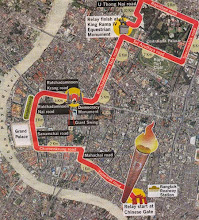MAHIDOL UNIVERSITY
Wisdom of the Land
The Celebration of the 40th Anniversary of the Royal Conferment of the Name Mahidol
to the University
International Conference
on
Buddhism and Clinical Psychology: Ancient Wisdom and Modern Knowledge
6-7 August 2009
Organized by
The College of Religious Studies, Mahidol University in cooperation with Santa
Barbara Institute for Consciousness Studies
---------------------------
Mahidol University originated from Thailand’s first hospital (Sriraj), founded in 1888.
54 years later it became the University of Medical Sciences. In 1969 it was renamed with
great honor by H.M. King Bhumibol Aduliyadej after his own father HRH Prince of Songkla
who is widely regarded as the “Father of Modern Medicine and Public Health” in Thailand.
The conference is to celebrate the 40th anniversary of this conferment.
This is the second conference in the Buddhism and Science series initiated in 2007 by
the College of Religious Studies of Mahidol University.
Since the beginning of the 20th century there has been rapid growth in the number of
clinical psychologists as well as psychiatrists who are taking interest in the benefits of
Buddhist meditation and theory for treatment of mental problems such as stress, depression,
and attentional disorders. This same period has also witnessed the development of positive
psychology studying the strengths and virtues that enable individuals and communities to
thrive. The emphasis is on finding and nurturing genius and talent so that normal life may
become more fulfilling. This rapidly growing field of psychology also has a strong relevance
to Buddhism, which has been addressing these issues throughout its entire history.
The engagement between clinical psychology and Buddhism, however, is not oneway,
for in many respects the strengths of these two traditions are complementary. Clinical
psychology has made much progress regarding the diagnosis and treatment of mental diseases,
particularly in cases where the source of the mental problem can be traced to social and
biological influences. Buddhism sheds clear light on the inner causes of mental problems,
tracing them back to the three fundamental afflictions of confusion, craving, and hostility. And
while scientific interest in the development of mental virtues is relatively recent, Buddhism
has focused on this as a central theme throughout its entire history. On the other hand,
Buddhism has little to say about developmental psychology, which is astrength of the modern
scientific tradition. A growing number of clinical psychologists and Buddhists are recognizing
- 2 -
the great contributions each of these traditions has to make to the other, both in terms of their
respective theories and practices. This international conference will highlight the
complementary strengths of clinical psychology and Buddhism, with leading psychologists,
psychiatrists, Buddhist scholars and contemplatives addressing how these two traditions may
work together for the greater benefit of humanity.
Some of the topics to be addressed in this conference will be the nature of mental
disease and health from scientific and Buddhist perspectives, together with analyses of the
inner and outer causes of mental imbalances. The relation between ethics and mental health—
long overlooked in modern psychology—will also be addressed in ways that lend themselves
to empirical inquiry, rather than simple reliance upon religious authority. Thus, rather than
appealing to the authority of Buddhist tradition, Buddhist speakers in this conference will
adopt the pragmatic theme of “come and see” (ehi passi), which was prevalent in early
Buddhism. Likewise, the scientific contributions to this conference will sidestep the
materialistic biases that often creep into the mind sciences and approach this topic in a spirit of
open-mindedness that characterizes science at its best.
Intending participants will need to register by filling in the attached registration form.
Stressing the celebratory character of the conference no registration fee will be charged.
The conference schedule:
6 Aug. 2009
08.00 – 09.00 a.m. Registration
09.00 – 09.30 a.m. Opening Ceremony
09.30 – 10.30 a.m. Keynote Address: The need for integration of
Buddhism and Clinical Psychology
Speaker: Dr. B. Alan Wallace
President, Santa Barbara Institute for Consciousness Studies, U.S.A.
10.30 – 10.45 a.m. Break
10.45 – 11.45 a.m. A Bird’s Eye-view of Mental Health & Mental Illness in
U.S.A.
Speaker: Dr. Margaret Kemeny
University of California, San Francisco
11.45 –1.00 p.m. Lunch
1.00 – 2.00 p.m. Mental Health & Illness in Thailand
Speaker: Prof. Dr. Chamlong Disayavanish
Chiangmai University, Thailand
2.00 – 3.00 p.m. Buddhist Approach to Mental Health and Illness
Speaker: Prof. Dr. Vesna Wallace
Oxford University, U.K.
3.00 – 3.15 p.m. Break
3.15 – 4.15 p.m. Buddhist Mindfulness-based Therapy (Case study on Anxiety,
Depression)
Speaker: Prof. Dr. John Teasdale
Oxford University, U.K.
4.15- 4.30 pm Questions for clarification
- 3 -
7 Aug. 2009
09.00 – 10.00 a.m. Buddhist Mindfulness-based Therapy (Case study on attentional
disorder and hyper-activity)
Speaker: Dr. Lidia Zylowska, MD
University of California, Los Angeles
10.00 – 10.15 a.m. Questions for clarification
10.15 – 10.30 a.m. Break
10.30 – 11.30 a.m. Compassion Meditation and Mental Health
Speaker: Prof. Dr. Charles Raison
Emory University, USA
11.30 – 11.45 a.m. Questions for clarification
11.45 – 1.00 p.m. Lunch
1.00 – 2.00 p.m. Consequential Reflections
Speaker: Malcolm Huxter
Clinical psychologist, Australia
2.00 – 2.15 p.m. Questions for clarification
2.15 – 2.45 p.m. Concluding remarks
Speaker: Dr. Pinit Ratanakul, Director
College of Religious Studies, Mahidol University
-------------------------
- 4 -
บ้านอนุรักษ์ธรรมชาติ
-
แม้ว่าสภาวะโลกร้อนจะเป็นวิกฤตการณ์ที่ทวีความร้ายแรงขึ้นทุกวัน
แต่เราทุกคนสามารถช่วยเหลือโลก เพื่อประหยัดพลังงานได้อย่างง่าย ๆ
ด้วยการปรับเปลี่ยนพฤติกรรม แล...
17 ปีที่ผ่านมา



ไม่มีความคิดเห็น:
แสดงความคิดเห็น